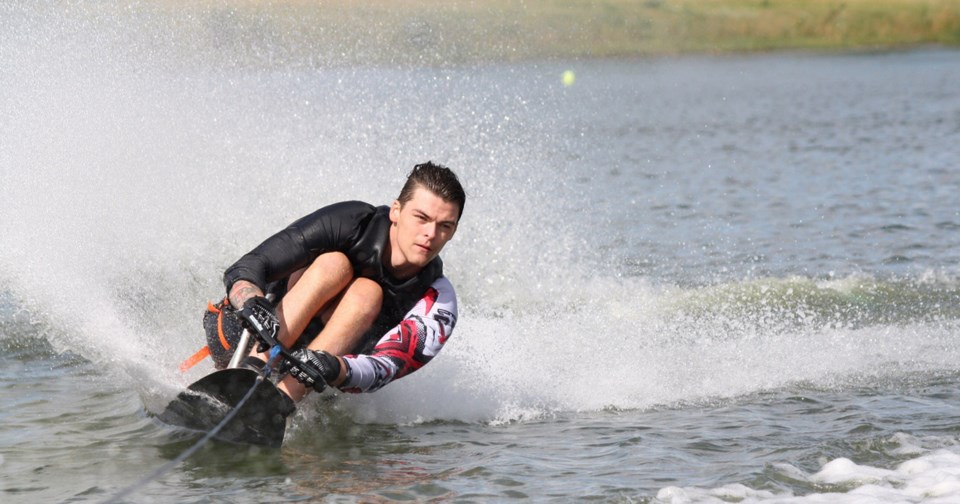HUMBOLDT — Only a few years after Jacob Wassermann took up adaptive waterskiing, the Humboldt product has earned a prestigious national honour.
The son of Kirby Wassermann and Mara Doepker was named Water Ski and Wakeboard Canada’s Adaptive Top Athlete of the Year. In 2018, just four months after being paralyzed in the April 6 Humboldt Broncos bus crash, Wassermann got his first taste of the sport.
He has developed into a national team athlete and travelled to his first world championships, in Norway, in 2019. The former hockey player has continued to pursue his passion for his new sport.
“It’s an honour to be named the Top Adaptive Athlete of the Year, with it being a different season last year it was a lot more focus on getting reps in on and off the water to grow as a competitor,” Wassermann said. “We have a lot of very talented skiers on our team that were all deserving of this award so like I said I’m very honoured to be picked as this year’s award winner.”
The award was selected by national coaches. Adaptive national team coaches Dave Wassill and Lisa Williams recommended him for the honour. On Water Ski and Wakeboard Canada’s Instagram feed, it was stated that the COVID-19 “pandemic did not stop Jacob from working every day to improve his skiing and progressively become a stronger athlete both on and off the water.”
“Jacob is a really committed athlete that shows great maturity and leadership beyond his years,” Wassill stated on the organization’s Instagram feed. “I am confident that Jacob will achieve his goal of medaling at the Worlds and bringing a team medal home to Canada. He is an amazing addition to our Adaptive National Team and his contributions on and off the water will really help grow our national program.”
Last summer was a challenging time for Wassermann and his fellow national team competitors. The COVID-19 pandemic prevented competitions from being held.
“Like I mentioned, it was a summer of lots of time on the water and in the gym,” said Wassermann, who lives and trains in Saskatoon. “Our fingers are crossed that we can compete this season. I’m mostly looking forward to seeing how all the work I’ve put in has helped improve skiing, with hopes of taking home a medal or two.”
After the 2018 Broncos bus crash, national adaptive waterskiing team member Nolan Barnes came to a Saskatoon hospital to visit Wassermann’s teammate Ryan Straschnitzki. Straschnitzki, who was also paralyzed in the accident, has taken up sledge hockey. Barnes, who was paralyzed in a car crash, later also started visiting Wassermann and introduced him to adaptive waterskiing.
“I enjoy the freedom and the speed that you get from waterskiing,” Wassermann said. “No other adaptive sport really lets you feel that kind of rush in my opinion.”
Adaptive waterskiing includes a trio of disciplines: tricks, slalom and jumping. When asked about what it feels like when you successfully land a jump, Wassermann said:
“It’s definitely a hard feeling to describe. It took a few hard falls before landing that first one, so it was an absolute rush of adrenaline mix with joy. A feeling that’s hard to get any other way.”
In hockey, Wassermann was a standout goaltender. In 2017-2018, in his 17-year-old season, he posted a 2.69 goals against average for the Broncos while being named the Saskatchewan Junior Hockey League’s Rookie of the Year and being tabbed for the SJHL’s All-Rookie Team. He also competed in two games for the Regina Pats of the major junior Western Hockey League. He said one thing that hockey gave him that has helped his waterskiing is his competitiveness.
“Waterskiing is a sport that you fail hundreds of times before you become the best and if there isn’t a goal to one day be at the top of the sport you can very easily get discouraged,” Wassermann said.
Whether it was hockey or waterskiing, Wassermann has always had the strong support of his parents.
“Shortly after I was home from the hospital, I got introduced to adaptive waterskiing, I was still living in Humboldt and the ski club was in Saskatoon,” he said. “Being fresh off an injury like I had, I wasn’t ready to make longer drives on my own. My parents would drive me into the city so I could have those first experiences with waterskiing. I ended up loving a sport that was so much different than what hockey was, and my parents were there the whole time helping to cheer me on and pushing me to be my best.”

